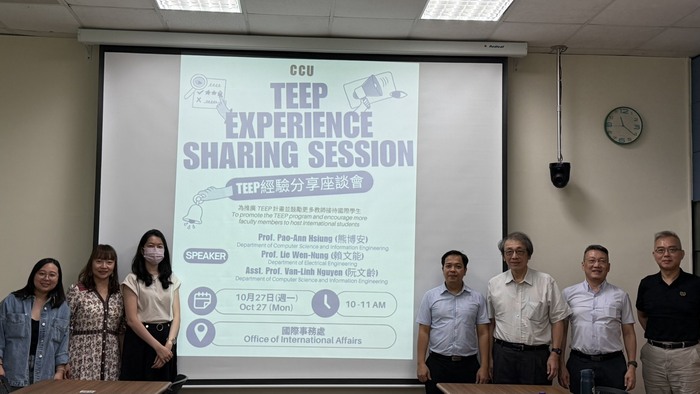中正大學舉辦「TEEP經驗分享座談會」——凝聚教師實務經驗,共探國際實習新契機

為推廣教育部「臺灣教育體驗計畫(TEEP)」並鼓勵更多教師接待國際學生,國際事務處於2025年10月27日舉辦「TEEP經驗分享座談會」,邀請資工系熊博安教授、電機系賴文能教授以及資工系阮文齡助理教授進行經驗交流,現場反應熱烈。
三位教授分別以多年參與TEEP計畫的實務經驗,分享從計畫撰寫、學生招募、住宿與經費安排到研究指導的全方位實務流程,協助教師更了解如何規劃與執行高品質的國際實習專案。
分享與多國學生合作研究的經驗,指出跨國團隊在人工智慧、資訊安全與量子運算等領域的合作,常能激發創新思維,並有助於學生未來申請國際獎學金與進修。他鼓勵教師與業界合作,將TEEP實習融入實際研發專案,提升學生研究應用能力與國際競爭力。
賴文能教授介紹工學院多年推動TEEP的成果,指出學院自2016年起積極接待亞洲各國學生來臺實習,並多年獲教育部經費補助全國第一。他建議教師可將TEEP視為碩士班預招生與研究品質篩選的機制,實習期以四至六個月為宜,以利培養具研究成果的學生;同時鼓勵各單位整合需求,由具行政職務之教師統籌申請大型產學型計畫,再分配給有意願的教師共同執行。此外,他提醒應協助學生於來臺前完成意外險購買,以確保實習期間安全。
阮文齡教授則以多年帶領國際學生研究的經驗,說明在TEEP執行過程中,明確的研究主題、固定的週會與具體的學習目標,是確保學生在短期內展現成果的關鍵。他強調應將實習生視為研究訓練的一環,透過技術討論、研究報告與論文撰寫,讓學生在研究與文化交流中獲得全方位成長。
座談最後進行綜合討論,多位教師與行政代表提出個人想法和建議。林昆模老師建議OIA可協助統籌與企業合作及企業參訪,以提升效率;劉文獻主任提議編製簡易的TEEP學生生活指南,提供交通與生活資訊;熊博安老師建議透過電子郵件向海外合作學校宣傳TEEP,以提高曝光度。鄭欣婷小姐(理學院)建議開設華語課程供TEEP學生選修。最後,許琇君專案經理建議建立TEEP共用平台整合資訊與活動,並獲多位教師響應。國際處將會聽取以上各方建議及想法,並在謹慎考慮後採納可行且效益最佳之方案。
本次座談除促進教師間經驗交流外,亦說明TEEP 2026年度申請時程與重點。國際事務處期盼透過此活動,鼓勵更多教師參與TEEP計畫,培育優秀國際人才,持續拓展中正大學在國際學術與教育合作的深度與廣度。
To promote the Ministry of Education’s Taiwan Experience Education Program (TEEP) and encourage more faculty members to host international students, the Office of International Affairs (OIA) organized the TEEP Experience Sharing Session on October 27, 2025. The event featured Professor Pao-Ann Hsiung (Department of Computer Science and Information Engineering), Professor Wen-Nung Lie (Department of Electrical Engineering), and Assistant Professor Van-Linh Nguyen (Department of Computer Science and Information Engineering) as speakers. The session was well received with active participation and discussion.
Each professor shared valuable insights based on their extensive experience in implementing TEEP projects, covering practical aspects such as proposal writing, student recruitment, accommodation, budget management, and research supervision, helping faculty better understand how to design and conduct high-quality international internship programs.
Prof. Hsiung shared his experiences collaborating with international students on research projects, emphasizing that cross-border teamwork in fields such as AI, information security, and quantum computing often sparks innovative ideas and enhances students’ prospects for international scholarships and advanced studies. He encouraged faculty to collaborate with industry partners, integrating TEEP internships into real-world R&D projects to strengthen students’ research skills and global competitiveness.
Prof. Lie highlighted the College of Engineering’s achievements in promoting TEEP since 2016, noting that it has hosted students from across Asia and has repeatedly ranked first nationwide in receiving MOE funding. He suggested viewing TEEP as a pre-admission and research selection mechanism for master’s programs, recommending internship periods of four to six months to ensure meaningful outcomes. He also encouraged departments to coordinate larger interdisciplinary or industry-linked projects under faculty leadership and reminded organizers to assist students in purchasing accident insurance before arrival to ensure safety during their stay.
Asst. Prof. Nguyen emphasized that clear research topics, regular meetings, and specific learning goals are key to ensuring tangible outcomes within a short internship period. She noted that TEEP interns should be treated as part of a research training process—through technical discussions, reports, and paper writing, students can achieve comprehensive growth in both research and cultural understanding.
In the panel discussion, several participants offered constructive suggestions.
- Professor Lin Kun-Mo proposed that OIA help coordinate industry collaboration and company visits to improve efficiency.
- Director Liu Wen-Hsien suggested preparing a TEEP Student Life Guide with information on transportation and daily living.
- Professor Hsiung recommended email outreach to partner universities abroad to enhance visibility.
- Ms. Hsin-Ting Cheng (College of Science) offering Chinese language courses for TEEP students.
- Project Manager Hsiu-Chun Hsu proposed establishing a shared TEEP information platform to integrate resources and event updates, which received positive feedback from many faculty members.
The OIA will take these suggestions into consideration and adopt feasible solutions that maximize effectiveness.
In addition to fostering faculty exchange, the session also covered the TEEP 2026 application schedule and key updates. Through this event, the OIA hopes to inspire more faculty members to participate in TEEP, nurture outstanding international talents, and further expand National Chung Cheng University’s global academic and educational collaborations in both depth and breadth.



